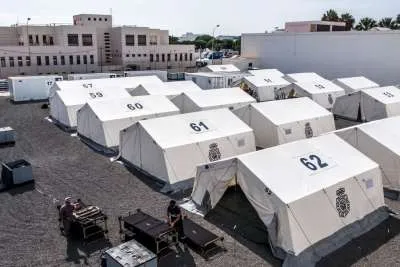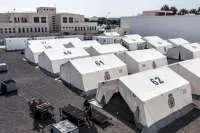How to Plan a Stress-Free Move to Spain: 8 Essential Steps
- 01-12-2023
- Travel
- Canarian Weekly
- Photo Credit: Unsplash
Spain, with its rich history, diverse culture, and fantastic climate, has become a magnet for expats seeking a new home. This beautiful country offers a unique blend of modern conveniences, breathtaking landscapes, and delectable cuisine that can make the move truly worthwhile. However, relocating to Spain or any foreign country can be stressful and challenging, especially if you're unprepared.
This article aims to simplify the process, outlining eight essential steps that will help you plan a stress-free move to Spain. By adhering to these guidelines, you can navigate the complexities of international relocation with more confidence, ensuring a seamless transition to your new life.
1 Research and Understand Spanish Culture
Immersing yourself in a new culture can be an exciting yet daunting prospect. Before your move, spend some time getting to know the customs, traditions, and social etiquette unique to Spain. Understand the local lifestyle, public holidays, and working hours.
Familiarize yourself with the pace of life, Spaniards are known for their laid-back approach, which may be a change if you're coming from a fast-paced society. The more knowledge you have, the easier your cultural transition will be.
For instance, did you know that Spaniards have a two to three-hour break in the afternoon called a "siesta," when most shops and businesses close? Knowing this beforehand can prevent frustration when trying to run errands during those hours.
2 Determine Your Visa Requirements
As a non-EU citizen, you will likely need a visa to live and work in Spain. The type of visa you require will depend on your reason for moving, such as work, study, or retirement. It's essential to research and understand the different types of visas available and their application requirements. Start the visa process early, as it can take several months to obtain one.
A lot of things are different in Spain from other countries, and that also includes the visa process. For instance, you will need a "NIE" (Numero de Identificación de Extranjero) for any legal transactions in Spain. This includes everything from getting a job to renting an apartment.
3 Hire a Professional Removal Company
Relocating your possessions to Spain can be a daunting task, especially if you have to do it all by yourself. Hiring a professional removal company can significantly ease this burden. These companies offer expert services in packing, transporting, and unpacking your belongings, ensuring they arrive safely at your new home. It's crucial to choose a removal company that has experience in international relocations and is familiar with Spanish laws and regulations.
Gather quotes from multiple service providers, assess their offerings and pricing, and review customer feedback before finalizing your decision. Many removal companies offer complimentary quotes; visit Seven Seas Worldwide for further details on potential costs. Keep in mind that opting for professional removal services can contribute to a hassle-free and seamless relocation to Spain. Additionally, explore supplementary services like storage solutions if they align with your requirements.
4 Learn Spanish

While many Spaniards speak English, especially in tourist areas, learning the local language will greatly enhance your experience and integration into Spanish society. It will also make daily tasks such as grocery shopping or going to the doctor much more manageable.
There are various options for learning Spanish, including online courses, private tutors, or enrolling in a language school in Spain itself. Whatever method you choose, start learning before your move to get a head start and make the transition smoother.
In Spain, the majority of people speak Spanish, but there are also several regional languages such as Catalan and Basque. While fluency is not required upon arrival, it is important to acquire a foundational understanding of the language. This will ensure a smoother and more enjoyable experience.
5 Secure Accommodation
Finding suitable housing is a vital step when moving to Spain. It would be best if you started researching your options well in advance, as demand can be high in popular cities like Madrid and Barcelona. Factors to consider include your budget, desired location, and type of accommodation (apartment, house, etc.). If you're not familiar with the area, it may be helpful to enlist the services of a local real estate agent who can guide you through the process.
It's also essential to have all necessary documentation ready when applying for housing, such as proof of employment or income and references from previous landlords. Keep in mind that rental contracts in Spain typically require a security deposit and the first month's rent upfront.
6 Familiarize Yourself with Practical Matters
There are several practical matters to consider before moving to Spain, including setting up a bank account, obtaining a Spanish ID card (DNI), and registering with the local authorities. It's also important to research healthcare options and obtain international health insurance before your move. Additionally, if you're planning on driving in Spain, you will need to obtain a Spanish driver's license. While it may seem overwhelming, taking care of these practical matters beforehand can save you considerable time and stress later on.
7 Prepare for Finances and Taxes

Before moving, it's crucial to consider the financial aspects of your relocation. Research the cost of living in Spain, including housing, transportation, and basic expenses such as groceries. It's also essential to understand Spanish taxation laws and how they may apply to you as an expat. Consult with a tax advisor or accountant to ensure you're prepared for any financial obligations upon arrival.
In case you're planning on working in Spain, it's also necessary to research the job market and obtain any necessary work permits or visas. Consider joining expat groups or networking events to make connections and learn about job opportunities.
8 Connect with the Expat Community
Moving to a new country can be isolating, especially if you don't know anyone in your new home. Therefore, it's essential to network and connect with other expats who have gone through the same experience or are currently living in Spain. Join online forums or social media groups dedicated to expats in Spain, attend local events and activities, and reach out to colleagues or classmates if you're studying. Connecting with the expat community can provide valuable support and resources during your transition.
Nevertheless, moving to Spain is an exciting adventure that requires careful planning and preparation. By following these essential steps, you can ensure a stress-free move and start enjoying all that this beautiful country has to offer.
Remember, research and preparation are key, and finding ways to connect with the local culture will enhance your experience. Now that you know these essential steps, you can confidently plan for a stress-free move to Spain and start enjoying all the adventures it has in store for you. Research, prepare, and embrace the new culture, and you'll be well on your way to a successful relocation.
Other articles that may interest you...
Trending
Most Read Articles
Featured Videos
TributoFest: Michael Buble promo 14.02.2026
- 30-01-2026
TEAs 2025 Highlights
- 17-11-2025





























































